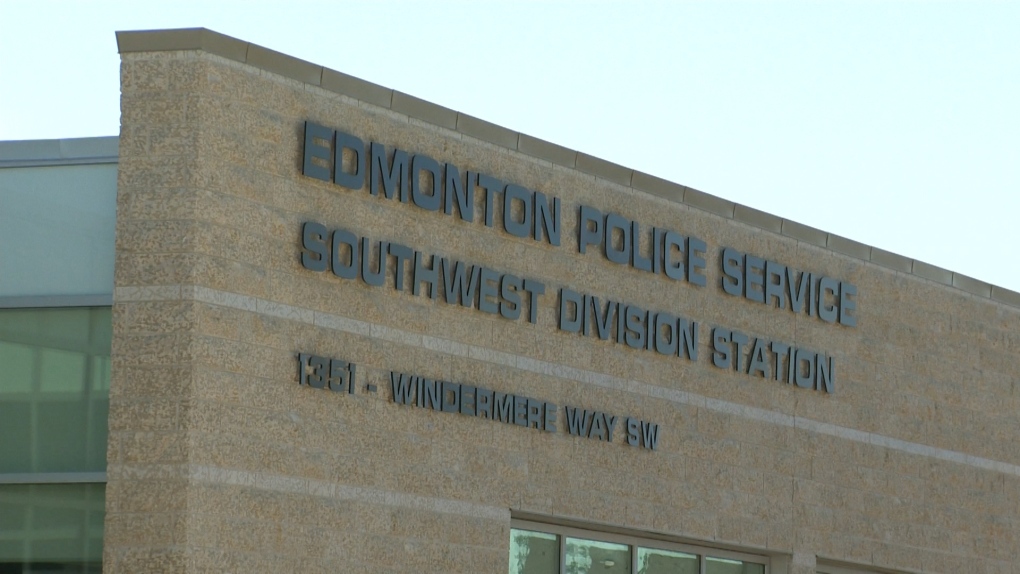No EPS wrongdoing for 2020 in-custody death, ASIRT finds, as probe poses medical assessment questions
 File photo: EPS Southwest Division station. (CTV News Edmonton)
File photo: EPS Southwest Division station. (CTV News Edmonton)
Alberta's police watchdog cleared the Edmonton Police Service of any negligence after an intoxicated man died in its custody but questions have been raised about whether or not officers should have brought him to the hospital first.
The Alberta Serious Incident Response Team (ASIRT) was directed to review an early morning incident in June 2020 where a man was taken into police custody after a disturbance at a southwest Petro-Canada gas station.
Around 4 a.m., officers responded for a report of a man appearing to be under drugs and acting "agitated."
The unnamed 48-year-old man was taken to the southwest division station after officers recognized he had been involved in two other trespass calls earlier that day, ASIRT recounted in the report.
Officers assessed the man but did not notice any signs of medical distress, ASIRT said. While police considered the risk the man posed to himself, officers believed placing him in a cell "would be the safest place for him."
ASIRT later determined that the man had taken crystal meth before his interaction with police and that community peace officers performed proper health checks on him while he was in police custody.
Despite this, roughly three hours after being placed in a cell, the man died. An autopsy found he died of methamphetamine toxicity. The medical examiner said it was possible "that had he been taken to the hospital instead of the police station, his life would have been saved."
In an interview with ASIRT investigators, the medical examiner elaborated, saying that a person found in a confused or abnormal state should be taken to hospital or seen by a paramedic before being placed in a holding cell.
"His intentional drug use was the cause of his death and had no connection to his detention by police," wrote Matthew Block, ASIRT assistant executive director, in his decision. "However, liability can still result for anyone responsible for the affected person while he was detained."
An internal EPS review of the incident was also undertaken, ASIRT said. EPS policy says if there are any doubts about a detainee's medical condition, officers are to always "resolve" them "in favour of the detainee's wellbeing."
Based on the evidence made available to ASIRT, Block said there were no reasonable grounds to believe the officers involved committed an offence.
Block added that while police officers have specialized training, they are not medical professionals.
"As such, they must be alive to situations where it may be important to have a person in their custody medically assessed," Block said. "Again, the standard is reasonableness and not perfection."
CTVNews.ca Top Stories

NEW Freeland to present 2024 federal budget, promising billions in new spending
Canadians will learn Tuesday the entirety of the federal Liberal government's new spending plans, and how they intend to pay for them, when Deputy Prime Minister and Finance Minister Chrystia Freeland tables the 2024 federal budget.
Ontario woman charged almost $7,000 for 20-minute taxi ride abroad
An Ontario woman was shocked to find she’d been charged nearly $7,000 after unknowingly using an unauthorized taxi company while on vacation in January.
Worker seriously injured after fall at Montreal Olympic Stadium
A man is fighting for his life after falling about 30 feet in an air duct at Montreal's Olympic Stadium on Monday, authorities say.
Tim Hortons launches pizza nationally to 'stretch the brand' to afternoon, night
Tim Hortons is launching flatbread pizzas nationally in a bid to pick up more afternoon and evening customers.
A look inside the gutted 24 Sussex Drive
The National Capital Commission is providing a glimpse inside the gutted 24 Sussex Drive, more than a year after the heritage building along the Ottawa River was closed.
NASA confirms mystery object that crashed through roof of Florida home came from space station
NASA confirmed Monday that a mystery object that crashed through the roof of a Florida home last month was a chunk of space junk from equipment discarded at the International Space Station.
Hazard ahead: Are cuts at Tesla a warning sign for the EV market in Canada?
Tesla has hit a series of roadblocks, including increased competition and declining sales. The company announced Monday it is slashing 10 per cent of its global workforce.
Fire rages through the 17th-century Old Stock Exchange in Copenhagen, toppling the iconic spire
A fire raged through one of Copenhagen's oldest buildings on Tuesday, causing the collapse of the iconic spire from the 17th-century Old Stock Exchange as passersby rushed to help emergency services save priceless paintings and other valuables.
Budget 2024 'likely to be the worst' in decades, former BoC governor says
Without having seen it, former Bank of Canada governor David Dodge believes that Tuesday's 2024 federal budget from Deputy Prime Minister and Finance Minister Chrystia Freeland is 'likely to be the worst budget' in decades.






























